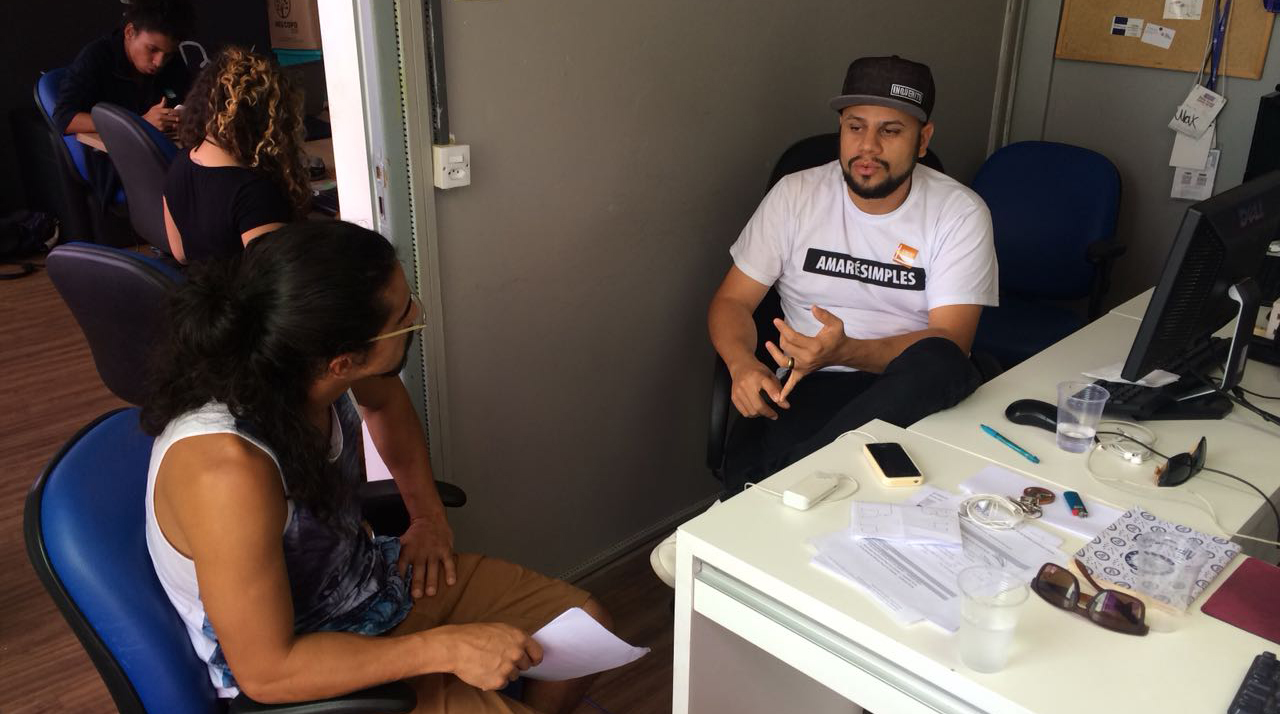Right to occupy the power
#FORMULATE
#REPRESENT
#DECIDE
Occupy and set priorities for national policy
Right to legislate
The assassination of councilwoman Marielle Franco, on March 14, 2018, in Rio de Janeiro, was cited at many moments in our research as a political assassination, an attack on black, feminine political bodies from the periphery occupying decision making spaces. This generated, yet again, a feeling of impotence around efforts to transform society. Patriarchal, racist and sexist structures were Marielle’s focus. She has become a symbol of these struggles.

“Oh Mortality,’ what mortality? This is genocide! Projected, articulated, planned…conceived and executed. This is the big question that we are facing in the country today…politics and occupying spaces are fundamental. Marielle’s death comes to tell us ‘this is not your place’…some guys went on social media with her photo and made degrading remarks about the assassination of a black, lesbian woman…This is my worry for the future. I fear that if we don’t say enough we risk not existing anymore. It is easy for them, they have weapons, they have status.”
Celinha, Belo Horizonte
The peripheries, their leaders and their issues will occupy institutions. Today Brazilian politics is full of old white men. Term after term, the same political class stays in power. The parties do not innovate to include diversity. The rules of the election game only apply to those that have a lot of money.
The right to occupy spaces of power labs are those that work on the front lines to pop the bubble and guarantee the presence of the peripheral population in institutions, since they are the majority of the population. In this search, the doer reinforces their potentialities. They also encounter countless difficulties when disputing and accessing the right to legislate.
Urgency to occupy and set priorities in politics
Based on the vision of these leaders, it is possible to create pathways to power for the peripheries, amplifying the echo of their realities and their demands. The processes for occupying power require different and often non-negotiable approaches.
Dialogue and recognizing partners to strengthen causes

“Politics is also the art of resolving the problems at the extremes. We have to dialogue, it is the mechanism that we found to not go to war, right?”
Rose, Belo Horizonte
“There is also the importance of reciprocity in social mobilization. We start from the place of social community mobilization, of popular communication, discourse, narrative and we are also engaged in other struggles across the city in order to strengthen the network. We go beyond mobilizing the network. The network feeds itself through collaboration.”
Vanessa, Belo Horizonte
The Political Body and the strength of collective presence
To build fronts that naturally identify and strengthen the action that was previously isolated. Even though a single person may represent the group, the collective is behind it, strong, forcing and reinforcing its structures.

“Occupying this space is looking at it in a different way. Through trans, peripheral, black eyes. It is a new way of seeing the world. I am not a disbeliever in politics, I am a disbeliever in this politics from the viewpoint of white men, heteronormative politics. This politics failed.”
Duda, Belo Horizonte
“We are not talking only about representation, we are talking about bodies that are excluded from these spaces and eventually eliminated.”
Vanessa, Belo Horizonte
Daniella Monteiro
“I grew up naturalizing daily violence, not because I wanted to, but because that is what happens to children from favelas. We naturalize a series of things,” she remembers. Later, her family bought a house outside of the favela, where she lived and felt that something was not as it should be. She was the only black child on the street. Even the games were different.
Contact with politics — and all of its complicated language — happened later at university, when she started the social sciences course at the Rio de Janeiro State university and became involved with the student movement. “Do you understand what legislators, ministers and judges are saying? And university researchers?” Today, Daniella works to translate the language of the streets into the spaces of power and seeks to guarantee rights the rights that she had access to but that other women and black youth did not. Because of this, she plans to run for state legislature this year. “We can’t take a step back. We are marching, advancing one step at a time.”
Rede Umunna
Rede Umunna is made up of black women who research and promote the presence of black women in political institutions. Umunna’s work involves political training for black women, positioning issues in the public agenda and data-centered research. In this electoral year, Umunna organized the campaign #BlackWomenDecide with the objective of qualifying the debate on the under-representation of black women in Brazilian politics.
Structural economic barriers
The leaders that emerged from this field point to a fundamental question: activism is a privilege of the few and urgent demands of life and economic sustainability do not permit them to enter into the political game.

“The challenge is helping political parties recognize that in order to increase the number of black women in politics we need to prioritize financing as well as encourage new candidates to run.”
Juliana, Rio de Janeiro
“I accepted that we also need to dispute symbols, too. The word Senate is symbolic, because Senate means Sir. A travesti has to dispute this space to give it new meaning. The roles there are usually played by older men. The minimum age to run for Senate is 35. The role of senator was not meant for travestis, because the life expectancy of a travesti is 35.”
Duda, Belo Horizonte
Absence in the judiciary
The absence of people from the peripheries in roles in the Brazilian justice system creates a gap in references. Black judges and/or judges that understand the reality at the periphery are exceptions. They are not capable of revealing the different contexts for the lack of access to constitutional rights in order to create intersectional parameters for the trial.

“The last place that you are going to get justice is in the Brazilian justice system, it is the last place. They are white women and men who always had a comfortable material condition, judging black men and women who wake up at 5am, 4:30am to work the whole day, get home at 8, 9 at night to earn minimum wage, which might be reduced even further with the labor law reforms. And where is the impartiality if you don’t consider that you are not looking at people from equal conditions when you try a case. It is a completely unequal race.”
Nana, Belo Horizonte
Marcelo Rocha
Marcelo Rocha is 20 years old and already understands the value of citizen participation as a tool for real transformation of society. He was part of the secondary school movement, and also integrated movements in favor of education and fighting for the rights of black people.
The left under re-construction
These leaders have started to provoke and constantly occupy the fragmented ideology of the left, which has historically tended to favored the demands of the peripheries more than the right. The new political leaders come up in the periphery do not want to negotiate with these outdated symbols of power, like business people and long-term politicians. The peripheries call for urgent renovation that also guarantees their representativity, in a non-negotiable way.

“And the left, if it really wants to be the left, will have to go to break with the rich and not reconcile with them, from our way of thinking. This is their role. A true left-wing party has to break with the rich. If it negotiates, the rich will co-op them, which is what has happened historically.”
Leonardo, Belo Horizonte
“On the left, we were extremely perverse, and that is why I think that today, social movements have to invest in training. So that there is not this gap in the future, you know? Who speaks for us?”
Celinha, Belo Horizonte

Max Maciel
Close to power, far from decision making. But not for long.
Max Maciel is 35 and lives in Ceilândia, a satellite city of Brasília, the federal capital. He is a social entrepreneur and trained teacher who specializes in race and gender public policy management. He coordinates the Urban Network for Sociocultural Action (RUAS, or STREETS in Portuguese). He has been fighting for change for 17 years in this place within the federal capital’s scenario of inequality. He is a candidate for the district congress in 2018.
Pretas em Movimento
(Black Women in Movement)
Where are the black men and women? What spaces do they occupy?
The truth is, the more subaltern the job, the more black people occupy it. And the more elevated it is, the more white people occupy it. Based on this discomfort, a group of black activists from Belo Horizonte started the Blacks in Movement Party to fight for space in institutions. The proposal for the party was suspended when they saw that strengthening black women candidates was a more viable path.
With that, the party transformed into Black Women in Movement, a collective that works on identifying and strengthening black political subjects who are willing to occupy spaces of power from councils to legislatures. “We are always at the base, always constructing, always mobilizing, always articulating, we are always in this movement, but we never occupied these spaces,” they said.
Today, the collective has representatives the Municipal Cultural Council and the State Cultural Council, in universities and in offices of city councilwomen in the Mines Gerais capital. And it is just the beginning of overcoming the scenario of oppression in the country.
Frente Autônoma LGBTQ de BH
(LGBTQ Autonomous Front of BH)
After years below the surface, Belo Horizonte’s Street Carnaval resurges with force in the 2000s, bringing with it a debate about the right to the city and the occupation of public space. And also along with it, diverse identity movements resurge among black people, women and the LGBTQ population. In other spaces, like the universities, these debates also amplify.
A series of initiatives arises out of this process. The LGBTQ population organized a unified front potentialize its discourse and amplify its effect, occupying space on municipal and state councils or taking part in legislative mandates. “When you recognize your history and the history of those that are by your side, you are capable of making proposals,” say the members of the LGBTQ Autonomous Front in the city.
Occupying power is risk
POLITICAL ATTACK
The arrival in and occupation of this political, institutional space brings with it realities and consequences that put these leaders at high risk. If on one hand their power is capable of informing, denouncing, prioritizing and questioning the status-quo, through a combative character of denouncing and making immediate demands on the authorities, on the other hand, it exposes these representatives and puts them in real danger as they receive threats, political pressures and violence.

“We are in the planning phase, but we want to dispute the elections. Some themes based on our principles break with many questions, with many of the problematic vices of institutionally. Prioritizing public debates, a commitment letter to support candidates who are engaged in designing another politics, a politics that is doesn’t have the same vices. We are not interested in handing out appointments, dividing them up and calling on people. We are interested in changing how politics is done, in trying to bring democracy to fruition for everyone, rather than for an exclusive sample. No one wants a black man in the office or a black woman on the City Council. If the majority are women and black people in society, we believe that an office with 20 people needs to have a majority of black women inside. This is something that we discuss and that is not negotiable, it is not the type of concession that we are going to make. They are black candidates, ok!? Are you willing to sign this with us?”
Evandro, Belo Horizonte
“This was by far one of the hardest years we have had. We weren’t able to move forward on anything we planned related to human rights and guaranteeing rights.”
Thainã, Rio de Janeiro
Marielle Franco represents the end, the middle and the beginning of this research. She lost her right to existence occupying spaces of power with her political body.
Her struggle represents the right to existence, to memory, to education, to culture, to economy, to living well, to political participation and to occupying power. Her struggle represents guaranteeing access to Constitutional rights.


“Political persecution happens not only here but also in other states. That is what happened in Marielle’s case, isn’t it? Everyone knows that her assassination was politically motivated, because she supported minorities. Many indigenous leaders that support other causes are assassinated, too.”
Fetxá, Brasília
A lemma. I am because we are.
A fear. A fear? Falling.
A dream. Staying strong.
A challenge. Stay balanced to keep from falling, to stay strong.
Politics. Responsibility. One of the most significant responsibilities in my life today.
Latin America. Vision with perspective.
Political innovation. Ways of making this new century possible. The 21st century.
Brazil. Unequal, but very welcoming. I don’t think this is it, but inequality comes to mind. Inequality around differences.
Marielle Franco
August 2017.

